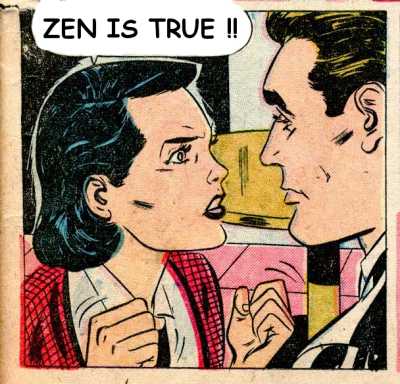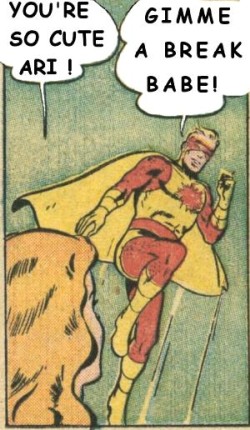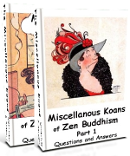Ancient Chan Koans from China
Most Chan Koans were written or collected in 9th to 13th century China.A famous example is the "Mumonkan", a book with 48 Koan, published by Chan master Wumen Huikai (jap. Mumon Ekai).
But there are much older Koans too, called "Miscellaneous Koans"
They train creative and intuitive problem solving.
Sounds strange. People normally use their (more or less) rational thinking to solve problems.
But in Chan only an intuitive, creative solution of Koans is accepted.
If you want to find out more about this "dogma" in Chan go to the Person that calls itself 'I'
There are six different subjects ancient Chan riddles or Koans deal with. For each Koan an answer is given to show that the Koan-questions and its answers are not logically connected.
To answer a Koan needs intuition and creativity, not logic and intellect.
That's what the ancient Chan Koans demonstrate over and over again.
(To give the answer for a Koan contradicts Chan-tradition, but it prevents useless mental movements in circles.)

Six Subjects of Ancient Koans
1. Body and Action
2. Things
3. Roads and Mountains
4. Water Challenges
5. Animals and Plants
6. Metaphysics and Theories
How to use this page?
If you can't believe the answer for a Koan is correct, or want to know more about it, click "???"
It brings you to a Koan box on another page. Click the "show/hide" button, to see the answer and the explanation.
If a Koan has no "???" button, you may download the free e-book "Miscellaneous Koans" to find it.
1. Body and Action
In all of spirituality body parts or body actions are often used to illustrate philosophical or religious teachings. E.g. "speaking in tongues" means, influenced by the holy spirit somebody cries out holy words in a language he or she doesn't know. (Second Koan)
The Koan answer brings the spiritual symbol "tongue" down to earth: Just (use your tongue and) say something.
Why do crimson lines never cease to flow?
...the answer is... weep and blow your nose ... ???
Why is it not our tongue that we speak with?
...the answer is... say something ... ???
A man of great strength will not lift his leg. Why?
...the answer is... Lift a leg then walk normally ... ???
What is my hand compared with the Buddha's hand?
...the answer is... show your hand ... ???
What is my leg compared with a donkey's leg?
...the answer is... walk on hand and knees ... ???
How do you free yourself from life and death?
...the answer is... oh, I'm dying, dying, oh, oh. ... ???
Where do you go after death?
...the answer is... At seven sharp I'll have breakfast ... ???
Enlightenment only means putting your head through the gate of nirvana. Explain.
...the answer is... Put your head through the door. ... ???
What does non-thinking really mean for you?
...the answer is... Resting your chin on your hand. ... ???
You attain enlightenment through intense practice but it doesn't change, it remains.
...the answer is... Stand up, run around ... ???
What is it that even an explorer or scientist cannot evade?
...the answer is... Raise one finger, say: No, no, no! ... ???
How can you follow a Buddha who can't be heard through voices and sounds or seen in colours?
...the answer is... What a wonderful song and all these pretty red roses. Great. ... ???
How do you hear the Diamond Sutra?
...the answer is... Put your hand to your ear: listen to the birds, the winds, the sounds ... ???
Top of Page
2. Things
This type of Chan Koans challenges our common sense. They are about dealing with normal "things". Everybody knows what you can do with "things" and what you can't.
But that's the cage of logic, you have to leave in Chan.
The Koans have a creative answer, that doesn't care about common sense.
Take hold of a plough with empty hands . How?
...the answer is... take the plough with both hands ... Why is a true Buddha sitting in the house?
...the answer is... Just sit on the ground. ... ???
Does the treasure room open by itself and let you use it at will?
...the answer is... There are trees and mountains and (slap the ground) this is the ground. ... ???
Why is philosophy like heaping up snow in a silver bowl?
...the answer is... rub your cold hands. ... ???
A Buddha made of wood why can't he pass through fire?
...the answer is... fire, fire, fire. Dying ... ???
How to put out a far away fire?
...the answer is ... move like a fire ... ???
How do you stop a temple bell 100 miles away?
...the answer is ... Ding-dong, ding-dong ... ???
Why is a Buddha of metal melting when he passes through a furnace?
...the answer is...... fall to the ground and die .... ???
What is the sharpest sword?
...the answer is...... Hit with a sword .... ???
Why do great Buddhist teachers always sit on top of a needle?
...the answer is...... just sit somewhere .... ???
Top of Page
 Koan: Who am I?
Koan: Who am I?
3. Roads and Mountains
Chinese Chan monks walked long distances between monasteries, which were built on top of mountains. This practice was called "the way".
Like on a western pilgrimages after some time landscape, walking and logic melt into one another. The pilgrim is "out of her/his mind".
Chan Koans question this unique experiences logically.
The answer can only be found by intuitively going back to the pilgrimage on roads and mountains.
Why are low and high absolutely equal in the Dharma?
...the answer is... Show with your hand: this table is 3 feet, I'm five feet ... ???
Where does the mind comes from when its dwelling nowhere?
...the answer is... After breakfast, going into the garden, cleaning my room, cutting a flower etc.. n. ... ???
What is today's way of Zen Buddhism?
...the answer is... Standing up, walking, working, etc. ... ???
Why does a clearly enlightened monk fall into a well.
...the answer is... It's really dark down here. You can't see anything. ... ???
Why is only one peak not white in winter?
...the answer is... Get up, say: It's me. ... ???
How does the Buddha's dharma arise from the supreme way?
...the answer is... sit down. ... ???
How does a cloud on Mt. Godai cook rice?
...the answer is... taste it. Ah, a very good rice. ... ???
How do you walk up a mountain road with 99 curves?
...the answer is... walk very slowly ... ???
Make mount Fuji take three steps. How?
...the answer is... walk three steps ... ???
Why are the thousand mountains covered with snow?
...the answer is... brush the snow from your sleeves ... ???
Top of Page
4. Water Challenges
Water can be dangerous, useful, pleasant, friendly, like a living being. Human imagination uses water as religious symbol (e.g. baptism) or as a philosophical sign.
Many Chan Koans refer to these human water-fantasies.
Forget about them. Water is water. Deal with it, as simple as possible. Thinking doesn't help.
"Draw some water with your hands" is always a good reaction on water.
Pick up a stone from 10000m deep in the ocean with dry hands.
...the answer is... dive into the water and get it ... ???
The bridge flows, the water is motionless. Why?
...the answer is... lean over the railing of a bridge. ... ???
It cannot get dry.
...the answer is... cry ... ???
It cannot get wet. It cannot get dry. What is it?
...the answer is... show the palm of your hand, then turn it ... ???
What's written on the stone 10000 meter deep in the ocean?
...the answer is... say your name ... ???
Slowly wade in the creek. What's its sound?
...the answer is... walk in water ... ???
Looking in a well a man without shadow is drawing water. Why?
...the answer is... Draw some water with your hands ... ???
How do you stop a sailing boat?
...the answer is... move your body like a sailing boat ... ???
It cannot get wet.
...the answer is... shake your head ... ???
Top of Page
 Koan: Who are you?
Koan: Who are you?
5. Animals and Plants
Humans like animals and plants are living beings. They are equals. There's basically no superiority.
To answer a Koan with animals or plants forget the Buddhist rules how to treat them.
To answer the Koan, refer to what a people normally do with animals and plants.
While walking you're riding a buffalo. How?
...the answer is... Hit the buffalo with a stick. ... ???
Freely watch birds and sketch their many tracks.
...the answer is... zig-zag with your finger in the air ... ???
Does a dog in heaven piss in front of a Buddha shrine?
...the answer is... Go down on hands and knees, lift one leg like a pissing dog. ... ???
Why is the edge of a water chestnut sharp, sharper than an awl?
...the answer is... No, no, no, NO ... ???
Why is the lotus leaf round, round like a mirror?
...the answer is... Yes, yes, yes, yes, YES. ... ???
What's the final purpose of your way through grass?
...the answer is... Beat a path through high grass. ... ???
Is it the moon the coral branches reflect?
...the answer is... Sing like a bird sitting in wonderful sunshine ... ???
Top of Page
 Buddha wrote a Sutra
Buddha wrote a Sutra
6. Metaphysics and Theories
Most cultures are interested in the metaphysics and similar theories. Chan is not.
The Koan "How do you put on a shirt of empty sky?" raises metaphysical questions. For a long time you could ponder about them.
In Chan this kind of questions are answered randomly or literally, like a child:
Just put on a shirt.
Count the stars in Heaven. Tell me their number!
...the answer is... point upwards and count one, two, three ... ???
Put out the stars in the sky.
...the answer is... switch off a lamp ... ???
How do you put on a shirt of empty sky?
...the answer is... put on a shirt ... ???
Does a hairsbreath difference equals the distance between heaven and earth
...the answer is... hearing the bird, the voice etc. ... ???
How do you save a ghost?
...the answer is... care for the baby on your arm ... ???
The principle of Zen is complete freedom. Why?
...the answer is... walk around, sing ... ???
All is under the law of change. Why?
...the answer is... in the morning it was raining now the sun's bright. ... ???
What's your place in karma?
...the answer is... cry like a newborn baby. ... ???
What is the true name of the Diamond Sutra?
...the answer is... Hit your body with your fist: this is it! ... ???
Why is the way intrinsically already accomplished?
...the answer is... There, see, those mountains, these trees, this ground, that wall ... ???
Go to Mumonkan Koans
Go to Free Koan Books
Return from Zen Koans to Home Page



